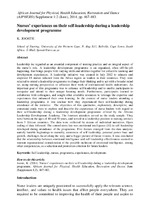| dc.description.abstract | Leadership is regarded as an essential component of nursing practice and an integral aspect of the nurse’s role. A leadership development programme is an organised, often off-the-job happening, that brings people with varying skills and abilities together for collective learning and development experiences. A leadership initiative was created in July 2012 to educate and empower 14 nurses selected from the Africa region as leaders in their countries. They were selected to attend a leadership programme to change their thinking and to act with a broader mind set, using nursing perspectives to influence their work of multinational health endeavours. An important goal of this programme was to enhance self-leadership and to enable participants to recognise and attend to their unique learning needs. Furthermore, participants learned to collaborate with colleagues, and sought other available resources to leverage the expertise and experiences that enhanced their own learning. In the context of nurse leaders attending a leadership programme, it was unclear how they experienced their self-leadership during attendance of the initiative. The objectives of this qualitative, exploratory, descriptive, and contextual study were to explore and describe the experiences of nurse leaders with regard to their self-leadership during a leadership development programme offered by the African Leadership Development Academy. The fourteen attendees served as the study sample. They were between the ages of 40 and 50 years, and served in a leadership position in nursing services from 5 African countries. The data were collected by means of individual narratives. Open coding of data followed. The central story line was emotional intelligence (EI) in self-leadership developed during attendance of the programme. Five themes emerged from the data analysis; namely humble beginnings to maturity, awareness of self-leadership, personal power base and growth, challenges faced along the way, and a bigger picture of future visions. It was concluded that the relationship between emotional intelligence and self-leadership effectiveness seemed to warrant organisational consideration of the possible inclusion of emotional intelligence, among other competencies, as a selection and promotion criterion for future leaders. | en_US |

